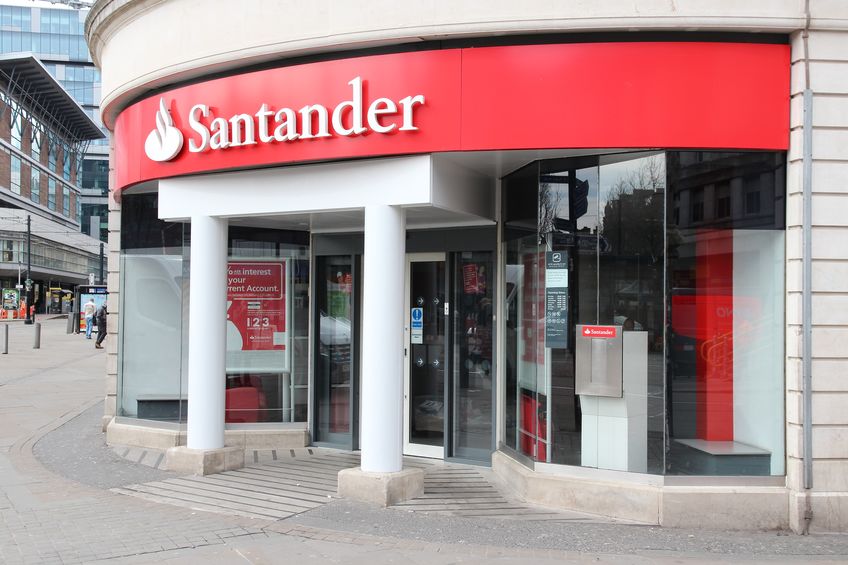Uncategorized
nCino Partners With Santander
July 24, 2018
nCino partnered with Santander Bank last week, its latest in a string of partnerships with major banks.
“Innovative institutions such as Santander Bank understand the importance of ensuring the customer experience is as fast, easy and intuitive as possible,” said Pierre Naudé, CEO of nCino. “[Santander] also recognizes that a shiny front end means nothing if the middle and back office doesn’t embrace at least the same degree of automation and intelligence.”
nCino is a cloud-based lending platform that grew out of Wilmington, North Carolina-based Live Oak Bank in 2012. Its founder, James Mahan III, then CEO of Live Oak Bank, along with his team, recognized a need to make the commercial lending process less time-consuming. So they created the nCino Bank Operating System internally for Live Oak Bank. But it soon attracted the interest of other financial institutions, in the US and beyond.
Last year, nCino told deBanked in that in addition to working with Live Oak Bank, it was working with more than 150 other financial institutions in multiple countries, including nine of the top 30 US banks. Now, according to the nCino website, over 200 banks and credit unions of varying sizes use the company’s Bank Operating System. TD Bank and SunTrust are among their largest bank partners.
An nCino spokesperson told deBanked that its Bank Operating System is sold on a subscription-basis that is driven by individual annual user licenses. This allows employees, executives and other stakeholders of a financial institution to access the benefits and functionality of nCino’s solution. nCino spun off from Live Oak Bank and became its own entity in 2014. Separately, Live Oak Bank (NASDAQ: LOB) went public in 2015.
 Santander will be using nCino’s platform for its business banking clients. Santander says that nCino’s cloud-based platform is accessible to customers from any device and will reduce the time it takes Santander to deliver loan decisions from start to finish by approximately 40 percent. In conjunction with a partnership with Accenture, Santander will be using nCino’s platform to help with customer relationship management, loan origination, account opening, workflow, enterprise content management, and instant reporting capabilities.
Santander will be using nCino’s platform for its business banking clients. Santander says that nCino’s cloud-based platform is accessible to customers from any device and will reduce the time it takes Santander to deliver loan decisions from start to finish by approximately 40 percent. In conjunction with a partnership with Accenture, Santander will be using nCino’s platform to help with customer relationship management, loan origination, account opening, workflow, enterprise content management, and instant reporting capabilities.
“Respecting our customers means giving them more insight into the loan process and getting them their money faster without any impediments so they can focus on running their businesses,” said Amir Madjlessi, Executive Vice President and Managing Director of Business Banking at Santander. “nCino’s platform automates the lending process from start to finish in a way that ensures a seamless, transparent experience for our customers that reduces delays and inefficiencies and securely connects our clients to our bankers whenever they need them with the touch of a button.”
nCino employs 500 people and is headquartered in Wilmington, North Carolina. The company recently opened an office in London and has plans to open additional offices in Australia and Canada later this year, according to a company spokesperson.
BCFP Launches Regulatory Sandbox for Fintech Companies
July 23, 2018
Mick Mulvaney, the Acting Director of the Bureau of Consumer Financial Protection (Bureau), told The Wall Street Journal last week that the Bureau has launched a “regulatory sandbox” to help fintech firms develop new products and services.
A regulatory sandbox is a framework set up by a regulator that allows certain fintech companies to conduct experiments for innovative products under the supervision of the regulator. The launch of this BCFP regulatory sandbox coincides with the hiring of Paul Watkins last week as Director of the Bureau’s new Office of Innovation.
It would seem no coincidence that Watkins was chosen to direct this new office at the Bureau because he had been in charge of fintech initiatives at the Attorney General’s Office in Arizona, the first state to create a regulatory sandbox earlier this year. Illinois is the process of creating a regulatory sandbox. And state banking regulators in New England spoke to deBanked last year about the possibility of a regional regulatory sandbox. According to an American Banker story, the model for the sandbox follows a 2014 initiative in the UK called Project Innovate, designed to promote competition while focusing on consumer interests. Currently, regulatory sandboxes have been implemented in other countries, including Abu Dhabi, Australia, Canada, Denmark, Hong Kong and Singapore, according to the New York University Journal of Law and Business.
Regulatory sandboxes are controversial. Before the Arizona bill passed allowing for the creation of the regulatory sandbox, a number of consumer advocacy groups protested, including the Southwest Center for Economic Integrity, Arizona Community Action Association, Children’s Action Alliance, and Protecting Arizona’s Family Coalition. These groups believe that the regulatory sandbox is simply a way of allowing fintech companies to bypass regulations at the expense of consumers.
Mulvaney wouldn’t agree. “You can make a strong argument…that new technology actually offers new and innovative ways to protect consumers,” Mulvaney said in The Wall Street Journal story.
BFS Co-founder Returns as Temporary CEO
May 23, 2018 Chairman and co-founder of BFS Capital Marc Glazer has assumed the role of Interim CEO. The former CEO, Michael Marrache, is no longer at the company.
Chairman and co-founder of BFS Capital Marc Glazer has assumed the role of Interim CEO. The former CEO, Michael Marrache, is no longer at the company.
“We’re on a nationwide search to find an individual that we feel will be an excellent candidate to continue BFS’s track record as a market leader and help grow the company,” Glazer said.
Founded in 2001, BFS is a veteran in the merchant cash advance industry. More than five years ago, the company began offering a business loan product, which now accounts for more than half of its revenue.
Glazer told deBanked that when BFS started offering its loan product, it widened its customer base significantly such that a sizable percentage of its customers are now business to business companies. Glazer said that MCA funding would not work for these kinds of customers because many of them get paid by check or get paid in larger amounts, but not on a daily basis.
Glazer said that working with ISO partners has always been a critical part of the BFS business model. What does Glazer look for in an ISO?
“Ultimately, you want to work with ISOs that view the relationship with not only the funder, but the merchant, [in mind,]” he said. “We look at ourselves as a responsible funder and put out offers that we not only think help the merchant, but that have payment terms that the merchant can afford. And the ISOs that we look for are ones that do the same kind of matching with the merchant.”
BFS has funded 400 different types of merchants, from florists to nail salons. But Glazer said that a big portion of the company’s customer base comes from either the hospitality industry or parts of the construction industry, including plumbing. To date, BFS has delivered more than $1.75 billion in total financing to small and mid-sized businesses, including $300 million funded in 2017. Loans are typically offered through the company’s banking partner, Bank of the Internet, according to Glazer.
BFS is headquartered in Coral Springs, FL and has an office in New York and one in southern California. It also includes a wholly owned subsidiary in the UK called Boost Capital. Altogether, BFS employs about 200 people with the majority of employees at its Florida office.
SBA 504 Loans Decline YoY 2017-2018
May 8, 2018 Funding of SBA 504 loans decreased by 26 percent from January through March 2017 compared to January through March of 2018, according to SBA (Small Business Administration) data. In the first three months of 2017, $1,326,601,000 of SBA 504 loans were funded compared to $987,896,000 of SBA 504 loans in the first three months of 2018. The number of companies that received SBA 504 loans also fell January through March year over year. There were 1,574 companies that took SBA 504 loans from January through March of 2017, compared to 1,290 companies over the same period this year, a decrease of 18 percent.
Funding of SBA 504 loans decreased by 26 percent from January through March 2017 compared to January through March of 2018, according to SBA (Small Business Administration) data. In the first three months of 2017, $1,326,601,000 of SBA 504 loans were funded compared to $987,896,000 of SBA 504 loans in the first three months of 2018. The number of companies that received SBA 504 loans also fell January through March year over year. There were 1,574 companies that took SBA 504 loans from January through March of 2017, compared to 1,290 companies over the same period this year, a decrease of 18 percent.
The SBA 504 loan is a government-backed loan that can only be used for commercial real estate or long-term machinery purchases. It differs from the more common SBA 7(a) loan, which is a general purpose loan that can be used for anything from working capital to business acquisition.
When contacted regarding the decline in the dollar amount volume of loans issued this year compared to last, the SBA submitted the following response from Bill Manger, Associate Administrator for the SBA’s Office of Capital Access:
“After a very strong FY17 of 504 SBA Lending, this year the program has performed on par with longer-term trends. We have also seen banks making more conventional loans without the SBA guarantee due to the strength of the U.S. economy and increased small business optimism brought about by the regulatory reforms and tax cuts championed by the Trump Administration. The SBA continues to work with our Certified Development Companies and Lending Partners to further strengthen the 504 Program and ensure it is helping create and grow U.S. small businesses. In addition to our 10 Year and 20 Year Debentures, last month the SBA implemented a 25 Year Debenture for 504 loans, offering fixed-rate financing for an additional 60 months to our small business owners. We believe this new product will be looked upon favorably by our stakeholders and borrowers by offering a longer term loan that will improve the cash flow of entrepreneurs utilizing the program.”
LendingPoint Debuts Point of Sale Lending Platform for Merchants
March 6, 2018LendingPoint announced today the launch of LendingPoint Merchant Solutions, a platform that allows merchants to offer loans to their customers for purchases ranging from furniture to medical procedures.
“When merchants offer consumer financing at the point of sale, they can remove friction and increase conversion,” said Mark Lorimer, Chief Marketing Officer of LendingPoint. “Our ability to offer shared risk plans, payment servicing plans as well as the full suite of promotional loan products, allows us to service all of a merchant’s customers from 850 all the way down to 500 FICO scores.”
Banks have long provided customers with loans for large priced items, but Lorimer told deBanked that it is very uncommon for non-banks to provide this service, particularly those that carry loans on their own balance sheet.
“The thing that’s different about our program is that in almost every single instance, when you apply for a loan at the point of sale, the first thing that happens is your credit is pulled,” Lorimer said. “This knocks down your credit for a while [and] if you’re in the near prime [FICO score range], 600, 680, you’re usually not going to be approved by a bank.”
Instead of pulling a customer’s credit score, LendingPoint Merchant Solutions does a soft credit pull, which has no impact on a customer’s credit, according to Lorimer.
“Depending on [what] the merchant is interested in, we can get close to 100 percent approval because we can take the loans between 600 and 850 ourselves,” Lorimer said.
LendingPoint offers point of sale loans that range from $500 to $15,000 with terms from 12 to 60 months. And the company responds to customers in a matter of seconds with an approval decision. Merchants get paid in full by LendingPoint Merchant Solutions at the point of sale and the customer does not always pay interest on the loan, as long as they pay within a promotional period set out by the merchant.
In December of last year, LendingPoint acquired LoanHero, which specialized in merchant onboarding, program management and reporting technology. LendingPoint Merchant Solutions combines LoanHero’s know-how with LendingPoint’s credit underwriting, risk management, and customer service expertise. The LoanHero brand has been retired and will now operate as LendingPoint Merchant Solutions.
LendingPoint was founded in 2014 and has issued nearly $500 million in consumer loans to more than 70,000 borrowers.
Drift Capital Partners Credit Facility Shows Confidence in Fintech
January 20, 2018Drift Capital Partners, LLC, an alternative asset management company, announced a new $50 million credit facility earlier this month. The funds will be used to “expand its portfolio of structured credit solutions to FinTech enabled Non-Bank Financial Services companies and allow them the opportunity to increase lending to ‘main street’ businesses,” a company release said.
Drift previously provided $25 million in financing to McClean-based Breakout Capital.
“Since its inception, Drift has been focused on developing solutions to bridge the chasm between institutional investors and main street businesses and we believe this facility is an important step toward solidifying that connection,” said McLean Wilson, Managing Partner of Drift in a company release.
Law Firm or Law Fail? Debt Settlement Company’s Legal Footing Called into Question
December 6, 2017The first major volley in the lawsuit filed by plaintiffs Yellowstone Capital and EBF Partners (“Everest Business Funding”) against a debt settlement company and their alleged ISO partners has been exchanged. And it’s a doozy.
Three of the eight defendants, Mark D. Guidubaldi & Associates, LLC (d/b/a Protection Legal Group) aka PLG, Corporate Bailout, LLC, and PLG Servicing, LLC have sought to collectively dismiss the complaint on the grounds that they are attorneys “engaged in the practice of law with the Merchants as their clients.”
PLG, a self-described “multi-jurisdictional law firm that practices law in various jurisdictions nationwide,” argues in their motion papers that those employed by Corporate Bailout and PLG Servicing carry out certain administrative and support tasks for PLG. And it’s okay that no one at either of those companies are attorneys, they claim, because PLG supervises it all. That enables them to be covered as attorneys in an attorney-client relationship, they assert.
 If true, they might want to try harder at supervising. As you might remember, Corporate Bailout, a telemarketing debt settlement firm, was featured on the cover of the New York Post earlier this year after being sued for running an operation “so sexually aggressive, morally repulsive, and unlawfully hostile that it is rivaled only by the businesses portrayed in the films ‘Boiler Room’ and ‘The Wolf of Wall Street.’”
If true, they might want to try harder at supervising. As you might remember, Corporate Bailout, a telemarketing debt settlement firm, was featured on the cover of the New York Post earlier this year after being sued for running an operation “so sexually aggressive, morally repulsive, and unlawfully hostile that it is rivaled only by the businesses portrayed in the films ‘Boiler Room’ and ‘The Wolf of Wall Street.’”
Corporate Bailout’s principal office is in New Jersey. PLG, the law firm, is based in Illinois. Can it really be that the former is considered a law firm through a relationship with the latter?
Whoa, not so fast, says an amended complaint filed by the plaintiffs on Tuesday, which argues that not even PLG is a legitimate law firm. “In fact, none of the Debt Relief Defendants is a law firm engaged in the provision of legitimate legal service,” they contend. “PLG is not even registered as a law firm in Illinois, as required by the rules of the Illinois courts,” they add.
If true, then this case could potentially have far-reaching consequences beyond simple tortious interference.
Some excerpts from this bombshell allegation:
PLG has one employee who is a lawyer, but does not as a rule advise or represent its customers. The advice those merchant customers receive is given by non-lawyers at Corporate Bailout and PLG Servicing, who approach and recruit merchants in ways no lawyer subject to the Rule of Professional Conduct 7.3 would ever be permitted to solicit clients. The non-lawyer personnel at Corporate Bailout and PLG Servicing are not supervised by the solitary lawyer at PLG, but by [Mark] Mancino and [Michael] Hamill, who are not lawyers – an arrangement that, if PLG were a law firm engaged in the provision of legitimate legal services, would violate Rule of Professional Conduct 5.3. To the extent that any of the advice the non-lawyers at Corporate Bailout and PLG Servicing give to merchants in furtherance of the Debt Relief Defendants’ tortious activity is legal advice at all, giving it violates the prohibition on the unauthorized practice of law. PLG orchestrates this activity, which damages the merchants as well as their Merchant Cash Advance Providers, in flagrant and deliberate disregard of the law.
[…]
Although the merchants are told that they are paying the funds into an “escrow account,” in reality PLG does not treat the funds like client escrow funds; it pays itself from them from the beginning, regardless of whether it is providing any services, and with no differentiation between client funds and funds payable to PLG. If PLG really were a law firm engaged in the provision of legitimate legal services, its practices with respect to client funds would be barred by the Rule of Professional Conduct 1.15.
– plaintiffs in the Amended Complaint (<-- click to download a copy)
Plaintiffs have also added Michael Hamill as an individual defendant. Fellow co-defendants Mark Mancino, American Funding Group, Coast to Coast Funding, LLC, ROC Funding Group, LLC, and ROC South, LLC did not file a response to the original complaint.
Small Business Finance Association Releases Best Practices Just in Time
April 13, 2016
The Small Business Finance Association (SBFA) has finally released their long awaited best practices guide. The four overarching principles are transparency, responsibility, fairness and security.
Unlike other organizations that have called for APR disclosures, the SBFA believes that the total dollar cost of the transaction is the most important way to achieve that goal. It’s also because the organization’s core members are engaged in a form of factoring most often referred to as merchant cash advances. Those transactions don’t have interest or interest rates and thus no way to ascribe an APR.
As part of the announcement, SBFA VP and RapidAdvance Chairman Jeremy Brown said, “Small business owners are a powerful constituency and we want to give them the utmost confidence in the alternative finance industry. These best practices are our way to prove to small businesses that our industry will consistently offer transparent, fair, and responsible choices to meet their needs.”
The timing could not be better. Earlier this morning, Stephen Denis, the executive director of the SBFA, testified in an Illinois State Senate hearing to protest a controversial bill that would effectively outlaw nonbank business lending under $250,000.
Among the bill’s strangest rules, is the restriction on monthly loan payments to being no more than 50% of a business’s net income, which would cause all businesses breaking even or reporting a loss to be prohibited from obtaining a loan from a nonbank or nonprofit source by law.





























